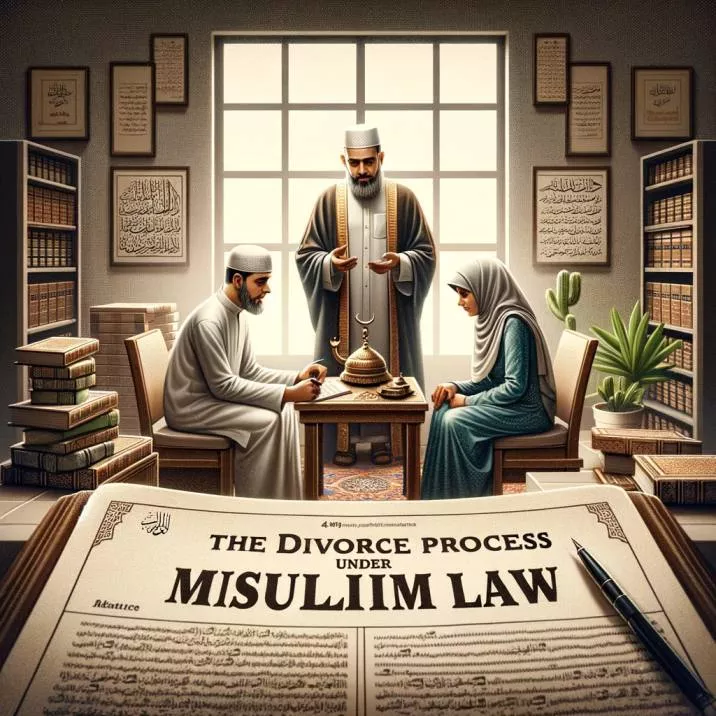In this article we have explained Divorce Procedure in India.Navigating the complexities of divorce in India requires an understanding of its legal framework. This article delves into the divorce procedure in India, offering a step-by-step guide to help individuals understand their rights and the legal process involved.
Understanding Divorce Law in India
Divorce in India is governed by various personal laws related to different religions and the Secular law for all citizens. The primary statutes include the Hindu Marriage Act, 1955, the Indian Divorce Act, 1869 (for Christians), the Parsi Marriage and Divorce Act, 1936, the Special Marriage Act, 1954, and the Muslim Personal Law (Shariat) Application Act, 1937, for Muslims.
Types of Divorce in India
Mutual Consent Divorce
This is the simplest form of divorce, where both spouses agree to dissolve the marriage. The process is relatively faster and less complicated.
Contested Divorce
In cases where one spouse does not consent to the divorce, the other must file for a contested divorce, citing specific grounds such as cruelty, desertion, conversion, adultery, mental disorder, communicable disease, or renunciation of the world.
Divorce Procedure in India: A Comprehensive Guide
Filing a Petition
For Mutual Consent Divorce:
- Filing of Petition: Both parties jointly file a petition seeking divorce in the family court.
- Appearance in Court: The court schedules a hearing, and both parties must be present.
- Statement Recording: Statements of both parties are recorded to affirm their mutual consent.
- Cooling-off Period: A cooling-off period of six months to eighteen months is given to reconsider their decision.
- Second Motion: After the cooling-off period, if both parties still wish to proceed, they file a second motion.
- Final Decree: The court, after hearing both parties, may pass the decree of divorce.
For Contested Divorce:
- Filing of Petition: The aggrieved spouse files a divorce petition on one of the specified grounds.
- Court Notices: The court issues a notice to the other spouse.
- Response: The respondent must file a reply within the stipulated time.
- Trial and Evidence: The court conducts a trial, where both parties present their evidence and witnesses.
- Arguments and Judgment: After hearing arguments, the court may pass a decree of divorce if grounds are proven.
Documentation Required
- Marriage certificate
- Identity proofs
- Address proof
- Photographs
- Evidence supporting the grounds for divorce
- Details of assets and income
Custody of Children and Alimony
The court also addresses custody of children and alimony during the divorce proceedings. Child custody can be joint or exclusive, depending on the child’s best interest. Alimony may be awarded to either spouse based on income, lifestyle, and the spouse’s ability to earn.
Conclusion
The divorce procedure in India involves multiple steps, from filing a petition to the final decree. Understanding the legal process and seeking professional legal advice can simplify the complexities involved. Whether it’s a mutual consent divorce or a contested one, knowing your rights and obligations is crucial for a smooth legal journey.
You can also read :- Divorce Procedure for Muslim & Divorce Procedure for Christian
FAQs on Divorce Procedure in India
1. What is the first step in filing for divorce in India?
Answer: The first step is to file a petition in the family court by either spouse, depending on whether it is a mutual consent divorce or a contested divorce.
2. How long does a mutual consent divorce take?
Answer: A mutual consent divorce typically takes 6 to 18 months, including the mandatory cooling-off period.
3. Can the cooling-off period in mutual consent divorce be waived?
Answer: Yes, in exceptional circumstances, the court can waive off the cooling-off period if it believes that the waiting period would only extend their agony.
4. What are the legal grounds for a contested divorce?
Answer: Grounds include adultery, cruelty, desertion, conversion, mental disorder, communicable disease, and renunciation of the world.
5. Is it mandatory to hire a lawyer for divorce proceedings?
Answer: While it’s not mandatory, having a lawyer can help navigate the legal complexities and represent your interests in court.
6. How is alimony determined in a divorce case?
Answer: Alimony is determined based on several factors such as spouse’s income, lifestyle, duration of marriage, and the spouse’s ability to earn.
7. Can I get a divorce if my spouse refuses to consent?
Answer: Yes, you can file for a contested divorce on valid grounds if your spouse does not consent to the divorce.
8. What is a no-fault divorce?
Answer: India does not officially recognize the concept of no-fault divorce except in the context of mutual consent divorce, where both parties agree to dissolve the marriage without attributing fault.
9. Can we settle the divorce outside of court?
Answer: Yes, parties can opt for mediation to settle their differences and terms of divorce outside of court, but the final decree must be issued by the court.
10. How is child custody decided?
Answer: Child custody is decided based on the best interests of the child, considering factors like the child’s age, gender, parents’ lifestyle, and the child’s preferences if they are of sufficient age.
11. Can the terms of a divorce decree be modified?
Answer: Yes, terms related to child custody, alimony, or other financial arrangements can be modified with a petition to the court showing a significant change in circumstances.
12. What if I cannot afford a lawyer?
Answer: You may seek legal aid services provided by Legal Services Authorities for individuals who cannot afford legal representation.
13. Is mediation compulsory in divorce cases?
Answer: While not compulsory in all cases, courts often recommend mediation to help both parties reach a settlement amicably.
14. What happens if my spouse doesn’t respond to the divorce petition?
Answer: If your spouse does not respond within the stipulated time, the court may allow the case to proceed ex-parte, leading to a one-sided decision.
15. Can I remarry immediately after my divorce is finalized?
Answer: You must wait until the decree becomes final and the time for filing an appeal has expired, which is typically 90 days after the decree.
16. What documents are needed to file for divorce?
Answer: Required documents include the marriage certificate, identity proofs, address proof, income details, and any evidence supporting the grounds for divorce.
17. How are assets divided in a divorce?
Answer: Asset division depends on the couple’s arrangement, whether mutual or contested, and considerations like the duration of the marriage, contributions to the household, and each spouse’s financial status.
18. Can I file for divorce based on incompatibility?
Answer: Incompatibility is not a legal ground for divorce unless it falls under mental cruelty or is part of a mutual consent divorce petition.
19. What is desertion, and how does it impact divorce?
Answer: Desertion means one spouse abandoning the other without reasonable cause for a continuous period of at least two years, which is a ground for divorce.
20. Can I oppose a divorce petition filed by my spouse?
Answer: Yes, you can contest a divorce petition on various grounds, including disproving the reasons filed by your spouse.
21. How long does a contested divorce take?
Answer: A contested divorce can take several years, depending on the complexity of the case and the court’s schedule.
22. Is it possible to change lawyers during the divorce process?
Answer: Yes, you can change your lawyer at any stage of the divorce process.
23. What if my spouse lives abroad?
Answer: You can still file for divorce in India if you or your spouse are Indian citizens or have been married under Indian law, but the process may involve additional legal steps.
24. Can a divorce be granted without a court appearance?
Answer: Both parties must appear in court in case of a mutual consent divorce, especially for the final hearing. In contested cases, court appearances are necessary unless excused by the court under exceptional circumstances.
25. What if we reconcile during the divorce process?
Answer: You can withdraw the divorce petition if both parties reconcile and decide to continue their marriage.
26. How is maintenance calculated for children?
Answer: Maintenance for children is calculated based on the child’s needs, educational expenses, and the financial status of both parents.
27. Can I file for divorce if I don’t know my spouse’s whereabouts?
Answer: Yes, but you must prove to the court that you’ve made reasonable efforts to locate your spouse.
28. What is the role of a marriage counselor in a divorce case?
Answer: A marriage counselor may help the couple understand their issues better and possibly reconcile, or in case of divorce, help them approach it amicably.
29. Can same-sex couples file for divorce in India?
Answer: As of the last update, same-sex marriage (and consequently, divorce) is not legally recognized in India.
30. How does adultery affect divorce proceedings?
Answer: Adultery is a ground for contested divorce, and if proven, can impact the terms of the divorce, especially in matters of alimony and custody.
















